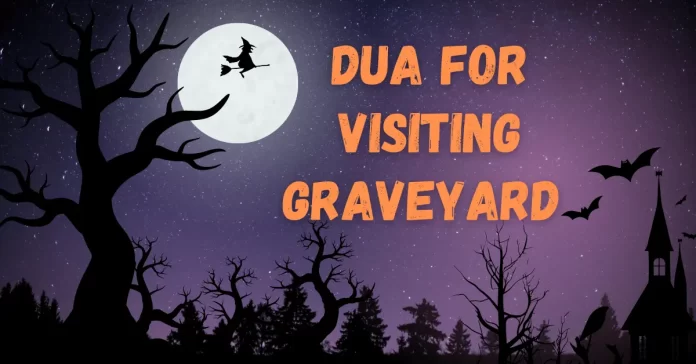Introduction to Dua for Graveyard
Visiting a graveyard is a solemn occasion that brings us face-to-face with the reality of life and death. It is a time for reflection, prayer, and seeking mercy for the deceased. In Islam, there are specific supplications (duas) recommended when visiting the graves. This guide will delve into the significance of these duas, provide the relevant Arabic texts, and reference the Quran and Hadith to underscore their importance.
The Importance of Remembering Death
Death is an inevitable part of life, and remembering it helps us live a more meaningful and righteous life. The Prophet Muhammad (peace be upon him) said, “Remember often the destroyer of pleasures (i.e., death).” (Sunan Ibn Majah). Visiting graves and praying for the deceased is one way to fulfill this reminder.
The Role of Dua for Graveyard in Islam
Duas are an essential part of a Muslim’s spiritual practice. They are a means of seeking Allah’s mercy, guidance, and support. When visiting a graveyard, specific duas are recited to seek forgiveness for the deceased and to remind oneself of the transient nature of life.
The Etiquette of Visiting a Graveyard
Preparing for the Visit
Before visiting a graveyard, it is essential to perform ablution (wudu) as a mark of respect and purity. Dressing modestly and behaving with solemnity and respect is also crucial.
Entering Dua for Graveyard
Upon entering the graveyard, it is Sunnah (the way of the Prophet) to say the following dua for graveyard
Arabic: السَّلَامُ عَلَيْكُمْ أَهْلَ الدِّيَارِ مِنَ الْمُؤْمِنِينَ وَالْمُسْلِمِينَ، وَإِنَّا إِنْ شَاءَ اللَّهُ بِكُمْ لَاحِقُونَ، نَسْأَلُ اللَّهَ لَنَا وَلَكُمُ الْعَافِيَةَ
Transliteration: As-salamu ‘alaykum ahla ad-diyaari minal mu’mineena wal muslimeen, wa inna in sha’ Allahu bikum lahiqoon, nas’alu Allaha lana wa lakumul ‘aafiyah.
Translation: Peace be upon you, O inhabitants of the graves, believers and Muslims. Indeed, we are, Allah willing, joining you. We ask Allah for well-being for us and for you.
Walking Through the Graveyard
When walking through the graveyard, it is recommended to maintain a respectful silence, reflecting on the lives of those who have passed and praying for their souls.
Specific Duas for the Deceased
Seeking Forgiveness and Mercy
One of the most important prayers for the deceased is seeking forgiveness and mercy for them. The Prophet Muhammad (peace be upon him) encouraged his followers to pray for the forgiveness of those who have passed away.
Arabic: اللَّهُمَّ اغْفِرْ لَهُمْ وَارْحَمْهُمْ وَعَافِهِمْ وَاعْفُ عَنْهُمْ وَأَكْرِمْ نُزُلَهُمْ وَوَسِّعْ مُدْخَلَهُمْ وَاغْسِلْهُمْ بِالْمَاءِ وَالثَّلْجِ وَالْبَرَدِ، وَنَقِّهِمْ مِنَ الْخَطَايَا كَمَا نَقَّيْتَ الثَّوْبَ الْأَبْيَضَ مِنَ الدَّنَسِ، وَأَبْدِلْهُمْ دَارًا خَيْرًا مِنْ دَارِهِمْ، وَأَهْلًا خَيْرًا مِنْ أَهْلِهِمْ، وَزَوْجًا خَيْرًا مِنْ زَوْجِهِمْ، وَأَدْخِلْهُمُ الْجَنَّةَ وَأَعِذْهُمْ مِنْ عَذَابِ الْقَبْرِ وَعَذَابِ النَّارِ
Transliteration: Allahumma aghfir lahum warhamhum wa ‘aafihim wa’fu ‘anhum wa akrim nuzulahum wa wassi’ mudkhalahum waghsilhum bil ma’i wath-thalji wal-baradi, wa naqqihim minal khataya kama naqqayta ath-thawba al-abyada min ad-danasi, wa abdilhum daran khayran min darihim wa ahlan khayran min ahlihim, wa zawjan khayran min zawjihim, wa adkhilhum al-jannata wa a’idhhum min ‘adhabil qabri wa ‘adhabin nar.
Translation: O Allah, forgive them and have mercy upon them and grant them peace and pardon them and honor the place of their entrance and enlarge the place they are entering and cleanse them with water, snow, and ice, and purify them of sin as a white garment is purified of dirt, and replace their earthly home with a better home and their family with a better family and their spouse with a better spouse, and admit them to Paradise and protect them from the torment of the grave and the torment of the Fire.
Prayer for Light in the Grave
Another important supplication is to ask Allah to provide light in the grave for the deceased, which is symbolic of peace and comfort in the hereafter.
Arabic: اللَّهُمَّ اجْعَلْ فِي قُبُورِهِمْ نُورًا
Transliteration: Allahumma aj’al fee quboorihim nooran.
Translation: O Allah, place light in their graves.
References from the Quran and Hadith
Quranic References
The Quran emphasizes the transient nature of life and the importance of seeking forgiveness for the deceased. Some relevant verses include:
Surah Al-Hashr (59:10): “And those who came after them say, ‘Our Lord, forgive us and our brothers who preceded us in faith and put not in our hearts [any] resentment toward those who have believed. Our Lord, indeed You are Kind and Merciful.'”
Surah Al-Isra (17:24): “And lower to them the wing of humility out of mercy and say, ‘My Lord, have mercy upon them as they brought me up [when I was] small.'”
Hadith References
The Hadith literature is rich with examples of the Prophet Muhammad (peace be upon him) visiting graves and praying for the deceased. Some notable hadiths include:
Sahih Muslim: Aisha (may Allah be pleased with her) reported: “The Prophet (peace be upon him) used to go to the cemetery of Al-Baqi’ and say, ‘Peace be upon you, abode of a people who are believers. What you were promised will come to you tomorrow, and you are postponed until a specified time. And Allah willing, we shall join you. O Allah, forgive the inhabitants of Baqi’ al-Gharqad.'”
Sunan Ibn Majah: Ibn Abbas (may Allah be pleased with him) reported: “The Messenger of Allah (peace be upon him) passed by the graves of Madinah and turned his face towards them and said, ‘Peace be upon you, O inhabitants of the graves. May Allah forgive us and you. You have preceded us, and we are following your footsteps.'”
The Spiritual Benefits of Praying Dua for Graveyard
Strengthening One’s Faith
Regularly praying for the deceased helps strengthen one’s faith and reinforces the belief in the Hereafter. It serves as a reminder of the transient nature of life and the importance of preparing for the afterlife.
Earning Rewards
Praying for the deceased is a virtuous act that earns rewards from Allah. It is a means of gaining His mercy and blessings.
Personal Reflections and Experiences
Stories from the Community
Sharing personal stories and experiences of visiting graveyards and praying for the deceased can provide comfort and inspiration to others. These stories highlight the emotional and spiritual impact of this practice.
My Own Journey
Reflecting on one’s own journey and the significance of praying for the deceased can add a personal touch to the discussion. It allows readers to connect on a deeper level and understand the importance of this practice.
Conclusion
Visiting and praying dua for graveyard is a significant act in Islam. It reminds us of the reality of death, strengthens our faith, and earns us rewards from Allah. The duas recited during these visits are powerful supplications that seek forgiveness, mercy, and light for those who have passed away. By following the Sunnah and incorporating these practices into our lives, we can honor the deceased and prepare ourselves for the Hereafter.
References
- The Quran
- Sahih Muslim
- Sunan Ibn Majah
By incorporating these duas and reflecting on their meanings, we can make our visits to the graveyard more meaningful and spiritually enriching.

